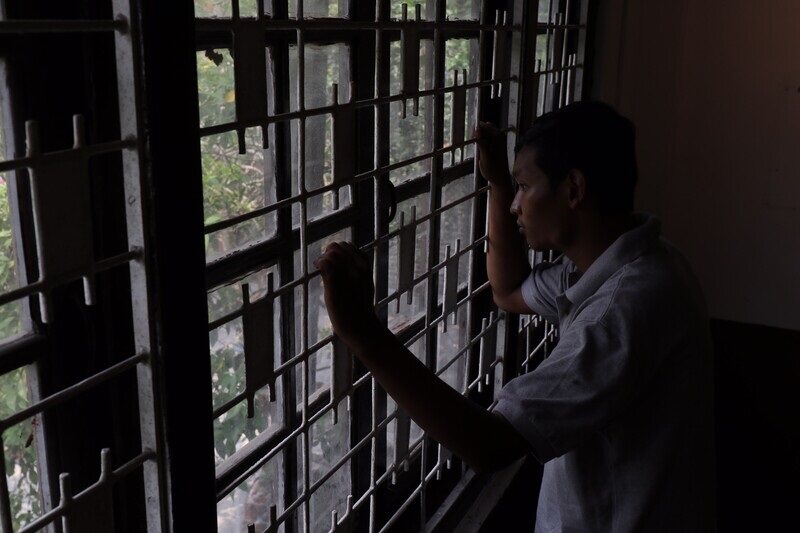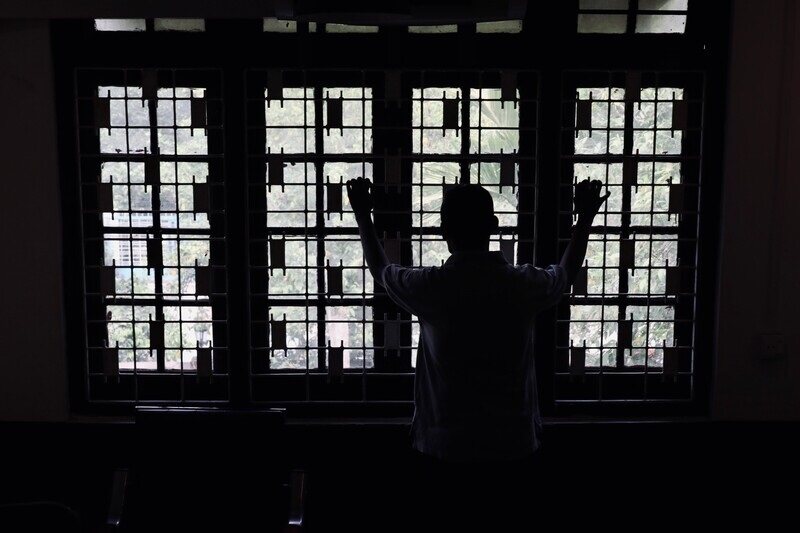
Forced Online Scamming
Forced scamming is a brutal new form of slavery. Right now, thousands of victims are being tricked, trafficked, trapped in guarded compounds and forced to scam people like you and me, under the threat of brutal violence. It’s being reported in global news outlets including The BBC, The Guardian and The Economist.
This crime is growing fast. Interpol has just announced that forced scamming is now a global crisis “representing a serious and imminent threat to public safety.” Banks are also warning of huge increases in online scams.
Forced scamming affects all of us – it’s urgent we stop it.

This nightmare is a reality for thousands of people like Yaza* (pictured) in South East Asia.
After months of struggling to find work due to political instability in Myanmar, Yaza finally found a well-paid job abroad in online marketing – a job that would mean he could provide for his family back home.
His new employers even offered to pay for his flight from Myanmar to the Philippines. But Yaza’s dreams were shattered when he arrived at a compound surrounded by barbed wire and electric fences.
The role he’d been offered wasn’t real. Instead, he was forced to create fake social media profiles and invite people to invest in cryptocurrency for up to 18 hours a day.
Yaza was tortured by the security guards. He wasn’t the only one.
• A victim is recruited via a fake job advert and trafficked into a heavily-guarded compound.
• Once at the compound, traffickers take the victim’s passport and phone. They are left trapped, isolated and alone.
• The victim is forced to conduct scams for up to 20 hours a day, six days a week.
• The victim often experiences extreme violence including electrocution or rape.
• Once at the compound, traffickers take the victim’s passport and phone. They are left trapped, isolated and alone.
• The victim is forced to conduct scams for up to 20 hours a day, six days a week.
• The victim often experiences extreme violence including electrocution or rape.
• Hundreds of thousands of people are estimated to be working in the scamming industry in South East Asia.
• Cambodia initially emerged as a primary hotspot for this crime, but exploitation has now been reported in Laos, Myanmar, Philippines – and further afield.
• 35+ different nationalities have been found in scamming compounds, including three cases of people trafficked from the UK.
• Forced scamming generates an estimated US$12B per year in Cambodia alone.
• UK banks are also warning of huge increases in online scams (BBC).
• Interpol has issued a warning that forced scamming is a “global threat to public safety.” (Interpol)
• Cambodia initially emerged as a primary hotspot for this crime, but exploitation has now been reported in Laos, Myanmar, Philippines – and further afield.
• 35+ different nationalities have been found in scamming compounds, including three cases of people trafficked from the UK.
• Forced scamming generates an estimated US$12B per year in Cambodia alone.
• UK banks are also warning of huge increases in online scams (BBC).
• Interpol has issued a warning that forced scamming is a “global threat to public safety.” (Interpol)
IJM staff in Cambodia, Thailand, Myanmar, Philippines, Indonesia and Malaysia are on the frontlines, working with governments and foreign embassies to:
• help bring people to safety
• provide survivors with legal help, aftercare, and repatriation support
• hold traffickers to account
• protect people from being trafficked in the first place.
Supported by people like you, IJM has collaborated with Cambodian National Police and partners to bring more than 100 people to safety in the past 18 months and to help many more with repatriation, legal and aftercare support. We won’t stop there.
Nine people from Indonesia – who IJM helped bring to safety from forced scamming in Cambodia – have just received justice.
• help bring people to safety
• provide survivors with legal help, aftercare, and repatriation support
• hold traffickers to account
• protect people from being trafficked in the first place.
Supported by people like you, IJM has collaborated with Cambodian National Police and partners to bring more than 100 people to safety in the past 18 months and to help many more with repatriation, legal and aftercare support. We won’t stop there.
Nine people from Indonesia – who IJM helped bring to safety from forced scamming in Cambodia – have just received justice.
We urgently need your help to stop people being trafficked and forced to conduct scams.
By giving, you will help send freedom, protection and justice to people in urgent need, and help IJM’s local teams and partners walk with people who have experienced violence and slavery so they can rebuild their lives in freedom.
© 2022 – 2023 INTERNATIONAL JUSTICE MISSION SINGAPORE (IJM SG LTD, UEN 202239409N)
© 1997 – 2023 INTERNATIONAL JUSTICE MISSION is a 501(c)3 organisation.